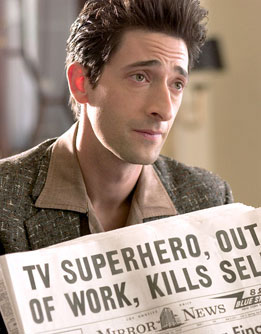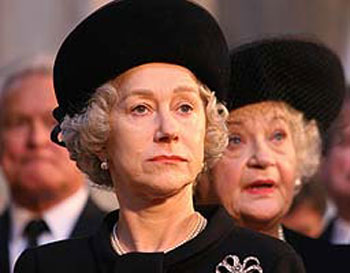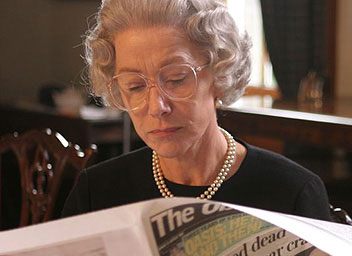|
I am just old enough to remember, vaguely, the Green Kryptonite jokes that were told after George Reeves was found shot to death in his Los Angeles bedroom. Though usurped in the public imagination by other tragic deaths that would be redundant for me to name, the mystery surrounding Reeves' 1959 death has been kept simmering just enough—through Kenneth Anger's Hollywood Babylon and the occasional tabloid article—to make it a viable subject for a movie in 2006.
Hollywoodland is the first feature for Allen Coulter, previously best known as a member of the creative team behind The Sopranos. The movie's original, far more appropriate title—Truth, Justice, and the American Way—had to be scotched after Warner Brothers, owner of the Superman franchise, threatened a lawsuit. Hollywoodland, however, is evocative enough of the general malaise of the life of Reeves, a small-part contract player who achieved fame (but not much wealth) with a part he found humiliating, and who drowned his humiliation in women and booze.
Paul Bernbaum's script begins after Reeves' death, and frames the flashbacks to his troubled life with the investigations of a fictional private detective named Louis Simo (Adrien Brody), who is hired by Reeves' estranged mother (Lois Smith) to prove her son didn't commit suicide as the police claim. Simo, a Hollywood bottom-feeder who dreams of making the big time by cracking the Reeves case, goes nosing around potential suspects, including Reeves' predatory fiancée, Leonore Lemmon (Robin Tunney); his ex-mistress, Toni Mannix (Diane Lane); and Toni's very scary husband, MGM production executive Eddie Mannix (Bob Hoskins).
Hollywoodland looks perfect, thanks to Leslie McDonald's production design and Jonathan Freeman's photography; we can see the dust motes floating in the harshly golden sunlight, inside the tacky motel rooms and bungalows. All the performances are persuasive, not only from the aforementioned actors but also from Jeffrey DeMunn, as Reeves' solicitous agent, and Joe Spano as Howard Strickling, Eddie Mannix's hotshot legal enforcer. Bernbaum's script is not unduly sensationalistic, but presents all the competing theories surrounding Reeves' death even-handedly and allows the audience to draw its own conclusions.
Nevertheless, Hollywoodland is only a half-good movie. The movie dissipates whenever it switches to Simo, who is just another Hollywood loser with delusions of grandeur, a drinking problem and an ex-wife who hates him. In Bernbaum's script Simo is dull and annoying; Adrien Brody does as much as is humanly possible with the character, but he fades into the woodwork in comparison with Ben Affleck as George Reeves.

While Brody is probably the more accomplished actor of the two, Affleck has a solidity of screen presence, a way of capturing and holding the camera, that Brody cannot begin to match.
The story only really comes to life when Affleck is on screen. Some commentators have insisted on attributing the excellence of Affleck's performance (which won him the Best Actor prize at the Venice Film Festival) to the lessons he learned from his run in the tabloids as "Bennifer" and his recent string of flops. Whatever the source of his performance, Affleck is extremely affecting as a strong-looking but weak-willed man withering in the hothouse atmosphere of Hollywood. The script, according to the sources I've read, plays fast and loose with facts; Reeves never really barbecued his Superman costume when the show was canceled, and the famous story of the little boy who brought a loaded pistol to one of Reeves-Superman's personal appearances, to see if the bullets would really bounce off his chest, is probably apocryphal. No matter: it's the sad, bewildered look in Affleck's eyes that you'll remember.
Whereas actors enter the public fishbowl only if and when they become famous, those unlucky enough to be born into the House of Windsor are there from birth to death. Of course, there are compensations, of which a life of extreme luxury is only one. "You may not be able to vote, ma'am," says a portrait painter at the beginning of Stephen Frears' The Queen, "but it is your government." Queen Elizabeth II (Helen Mirren), sitting for her official portrait in full court regalia, gives the painter a wry smile. "Well," she purrs, "that's some small consolation."
Peter Morgan's script for The Queen is a vivid demonstration of just how small that consolation is. Set in 1997, mostly during the aftermath of the sudden, horrible death of Diana, Princess of Wales, the movie depicts the basic disconnect between the monarchy and the English people that has existed at least since the days of Elizabeth's great-great-grandmother Victoria. That disconnect was borne of growing democracy in Britain, as the power of the monarchy began to shrink in proportion to the power of the people. But Victoria, at least, did not have to cope with the Information Age.
It's stating the obvious to say that Diana's death caused an unprecedented outpouring of grief, not only in Britain but worldwide. However—at least in Morgan's screenplay--this is not obvious at first to the Royal Family, ensconced in privacy in their summer residence at Balmoral Castle. The Royal Standard hadn't flown at half-mast at Buckingham Palace even at the death of Elizabeth's father, George VI, and never flew at all when the monarch wasn't in residence. Elizabeth, Prince Philip (James Cromwell) and the Queen Mother (Sylvia Syms) see no reason to break precedent for a woman who hadn't even been a member of the family at the time of her death, and whom they all remember in the bargain as a selfish, neurotic troublemaker.
New Prime Minister Tony Blair (Michael Sheen) is quick to see the public relations catastrophe in the Royal Family's icy reserve, and urges the reluctant Queen via telephone to come back to London, show herself to the people, make a public statement of mourning. He has a partial ally in Prince Charles (Alex Jennings), who also senses the mood of the people and begins to fear that the sounds of nearby trucks backfiring might, in fact, be something else. But the Queen Mum advises her daughter to stand firm: "You're the greatest asset the Royal Family has—perhaps the greatest it's ever had," she proclaims. Meanwhile, Philip declares his aristocratic disdain for the list of mourners at Diana's upcoming funeral: "A chorus line of pop stars and homosexuals!" he snorts.

The royals' recalcitrance is so great that at one point Blair throws up his hands and shouts, "How am I going to save these people from themselves?" There are plenty of people in the Labour Party who don't want him to—chief among them his cheerfully anti-monarchist wife, Cherie (Helen McCrory). She urges her husband to just let the Windsors show themselves to the world as "a bunch of freeloading, anachronistic nutters."
Of course, Elizabeth finally did come to London, make a public statement, and attend Diana's funeral. The genius of The Queen is in showing how much it cost her to do so. "THEY DIDN'T DESERVE YOU," said one of the signs placed at the Buckingham Palace gates after Diana's death; it would be closer to the truth to say that Diana and Elizabeth didn't deserve each other. Diana basically was a girl who just wanted to have fun, whereas for Elizabeth fun was never part of the equation. She saw the havoc created in her own family when her uncle—Edward VIII, a boy who just wanted to have fun—abdicated to marry the woman he loved. Elizabeth's father, a shy and modest man, was thrust onto the throne during the darkest days of the Depression, World War II and the long postwar austerity, and by the time he was 56 it had done him to death. Raised from the age of ten as the heir to the throne, put forth as the national symbol of hope during the horrors of the London Blitz, Elizabeth perfected the dignified, stiff-upper-lip reserve she believed her people wanted. Which indeed they did—then.

Frears, Morgan, and the cast of The Queen deserve plaudits for their extraordinary courage in making a film about heads of state in which most of the principals are still living, and in which some of the portrayals (particularly that of Prince Philip) are distinctly less than flattering. It helps enormously that they happened to make one of the best, most entertaining films to come out of Britain in the last decade. The dialogue sparkles; the action and characters, though obviously fictionalized, have the unmistakable ring of truth. Even if this isn't exactly the way things happened, you feel the makers of The Queen got the gist of it. The most fascinating part of The Queen is the ironic portrayal of the relationship between Elizabeth and Blair—the prime minister comes to admire his monarch more and more, whereas Elizabeth, resenting his role in the media brouhaha surrounding Diana, becomes ever frostier toward him. Not that she ever held him in awe: "You are our tenth prime minister, Mr. Blair," she reminds him at one point. "Our first was Winston Churchill." Later—in a pointed reference to Blair's current lame-duck status—she tells him that just as the people turned against her without warning, so one day they will turn against him.
All the performances in The Queen are superb reaffirmations of the glories of British Rep (and in the general praise I include Cromwell, the one American ringer in the cast). However, just as Elizabeth reigns over the United Kingdom, Helen Mirren reigns over—and rules--The Queen. Her physical transformation in the role is amazing, as is every other aspect of her performance. Mirren has always been a world-class expert in portraying deep emotion through a dignified façade, and the role of Elizabeth gives her an unprecedented chance to do so. If you want a textbook definition of noblesse oblige, there is none better than the one Mirren's Elizabeth gives us toward the end of The Queen: standing outside the gates of Buckingham Palace, reading the placards to Diana that essentially accuse the Royal Family of being her murderers, a brief look of sorrow crosses her face. Then she turns to the assembled crowd, and smiles.
|
